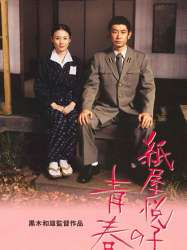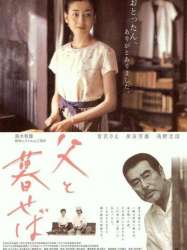Kazuo Kuroki est un Réalisateur et Scénariste Japonais né le 10 novembre 1930 à Matsusaka (Japon)

Kazuo Kuroki (黒木 和雄, Kuroki Kazuo), né le 10 novembre 1930 et mort le 12 avril 2006, est un réalisateur japonais. Fortement marqué par la guerre, Il est connu pour ses films sur les bombardements d'Hiroshima et Nagasaki.
Changeant d'école au gré des mutations de son père, Kazuo Kuroki est un élève peu assidu, il fait souvent l'école buissonnière pour aller voir des films au cinéma. Inquiets, ses parents le renvoient au Japon en 1942 auprès de ses grands-parents maternels à Ebino dans la préfecture de Miyazaki. Il est scolarisé à l'école de Kobayashi puis, vers la fin de la guerre, il est mobilisé pour travailler à l'usine Kawasaki Kōkuki qui fabrique des avions militaires. Le 8 mai 1945, Kazuo Kuroki va vivre ce qu'il appellera « la pire tragédie de sa vie » lorsque se rendant à l'usine avec des camarades, un raid de bombardiers américains survient. Onze de ses amis perdent la vie.
Après avoir entamé des études de sciences politiques à l'université Dōshisha, Kazuo Kuroki s'oriente rapidement vers le cinéma et s'engage avec Iwanani Production (Iwanami Eiga), une branche de Iwanami Shoten consacrée à la réalisation de documentaires éducatifs et de relations publiques, où il travaille comme monteur et assistant réalisateur. Il réalise son premier film en 1958, un documentaire de relations publiques nommé Electric Rolling Stock of Toshiba. Kuroki quitte Iwanani au début des années 1960 et travaille par la suite en indépendant. Un des plus remarquables documentaires réalisés durant cette période est sans doute Chronique d'un coureur de marathon (1964) sur l'athlète olympique japonais Kenji Kimihara.
En 1966, il réalise Le Silence sans ailes, son premier long métrage de fiction, un film qui explore les thèmes de l'héritage de la guerre et de la montée du crime organisé international. Dans les années 1970, quatre de ses films sont produits par la société de production indépendante Art Theatre Guild : L'Esprit malin du Japon (1970), L'Assassinat de Ryōma (1974), En attendant la fête (1975) et La Guerre atomique/L'Amour perdu (1978).
Fortement marqué par son expérience vécue le 8 mai 1945, il est l'auteur d'une trilogie, le Requiem de guerre, comprenant les films Demain - Asu (1988), qui décrit les derniers jours d'une famille vivant à Nagasaki juste avant le bombardement, L'Été d'un garçon en 1945 (2002) qui se rapproche de sa propre expérience durant la guerre et La Face de Jizo (2004) qui décrit une série de discutions imaginaires entre une survivante de Hiroshima et son père tué lors du bombardement.
Il meurt le 12 avril 2006 d'une crise cardiaque.
Source : Wikidata
Kazuo Kuroki

- Infos
- Photos
- Meilleurs films
- Famille
- Personnages
- Récompenses
Nom de naissance Kazuo Akimaru
Nationalité Japon
Naissance 10 novembre 1930 à Matsusaka (Japon)
Mort 12 avril 2006 (à 75 ans) à préfecture métropolitaine de Tokyo (Japon)
Nationalité Japon
Naissance 10 novembre 1930 à Matsusaka (Japon)
Mort 12 avril 2006 (à 75 ans) à préfecture métropolitaine de Tokyo (Japon)
Biographie
Kazuo Kuroki est né le 10 novembre 1930 à Matsusaka dans la préfecture de Mie, son vrai nom est Kazuo Akimaru. Sa famille déménage en 1934 en Mandchourie où il passe la majeure partie de son enfance, son père est ingénieur pour la société d'électricité Manden (Manchukuo Power Generation Company). Kazuo Mori connait là un premier drame puisque sa petite sœur âgée de trois ans se tue en tombant d'une fenêtre de l'appartement familial située au troisième étage à Changchun. La mort de sa sœur est son premier souvenir.Changeant d'école au gré des mutations de son père, Kazuo Kuroki est un élève peu assidu, il fait souvent l'école buissonnière pour aller voir des films au cinéma. Inquiets, ses parents le renvoient au Japon en 1942 auprès de ses grands-parents maternels à Ebino dans la préfecture de Miyazaki. Il est scolarisé à l'école de Kobayashi puis, vers la fin de la guerre, il est mobilisé pour travailler à l'usine Kawasaki Kōkuki qui fabrique des avions militaires. Le 8 mai 1945, Kazuo Kuroki va vivre ce qu'il appellera « la pire tragédie de sa vie » lorsque se rendant à l'usine avec des camarades, un raid de bombardiers américains survient. Onze de ses amis perdent la vie.
Après avoir entamé des études de sciences politiques à l'université Dōshisha, Kazuo Kuroki s'oriente rapidement vers le cinéma et s'engage avec Iwanani Production (Iwanami Eiga), une branche de Iwanami Shoten consacrée à la réalisation de documentaires éducatifs et de relations publiques, où il travaille comme monteur et assistant réalisateur. Il réalise son premier film en 1958, un documentaire de relations publiques nommé Electric Rolling Stock of Toshiba. Kuroki quitte Iwanani au début des années 1960 et travaille par la suite en indépendant. Un des plus remarquables documentaires réalisés durant cette période est sans doute Chronique d'un coureur de marathon (1964) sur l'athlète olympique japonais Kenji Kimihara.
En 1966, il réalise Le Silence sans ailes, son premier long métrage de fiction, un film qui explore les thèmes de l'héritage de la guerre et de la montée du crime organisé international. Dans les années 1970, quatre de ses films sont produits par la société de production indépendante Art Theatre Guild : L'Esprit malin du Japon (1970), L'Assassinat de Ryōma (1974), En attendant la fête (1975) et La Guerre atomique/L'Amour perdu (1978).
Fortement marqué par son expérience vécue le 8 mai 1945, il est l'auteur d'une trilogie, le Requiem de guerre, comprenant les films Demain - Asu (1988), qui décrit les derniers jours d'une famille vivant à Nagasaki juste avant le bombardement, L'Été d'un garçon en 1945 (2002) qui se rapproche de sa propre expérience durant la guerre et La Face de Jizo (2004) qui décrit une série de discutions imaginaires entre une survivante de Hiroshima et son père tué lors du bombardement.
Il meurt le 12 avril 2006 d'une crise cardiaque.
Le plus souvent avec
Filmographie de Kazuo Kuroki (7 films)
Réalisateur

紙屋悦子の青春 (2006)
, 1h51Réalisé par Kazuo Kuroki
Genres Drame, Romance
Thèmes Politique, Adaptation d'une pièce de théâtre
Acteurs Tomoyo Harada, Masatoshi Nagase, Kaoru Kobayashi
Note73%





In Kagoshima, in the final days of World War II, an offer of marriage comes to Etsuko Kamiya, who lives with her brother and his wife. The offer comes from Nagayo, but Etsuko is attracted to his friend, Akashi.

The Face of Jizo (2004)
, 1h39Réalisé par Kazuo Kuroki
Genres Drame
Thèmes La mer, Transport, Aviation, Politique
Acteurs Rie Miyazawa, Yoshio Harada, Tadanobu Asano
Note71%





Three years after the atomic bombing, there is a young female librarian in Hiroshima.

The Face of Jizo (2004)
, 1h39Réalisé par Kazuo Kuroki
Genres Drame
Thèmes La mer, Transport, Aviation, Politique, Adaptation d'une pièce de théâtre
Acteurs Rie Miyazawa, Yoshio Harada, Tadanobu Asano
Note71%





Three years after the atomic bombing, young librarian Mitsue live alone, plagued by guilt and sorrow over the death in the bombing of her father, who was her only living relative. One day, a young man, Masa, visits her library to study and find the morgue of the atomic bombing. Mitsue and the young man find themselves attracted to each other, but Mitsue fears that her grief for her father will not permit her to be happy. When she tries to break things off with Masa, she is visited by the ghost of her father, who encourages her to embrace life and pursue her budding romance with the young man.

Rônin-gai (1990)
, 1h57Réalisé par Kazuo Kuroki
Origine Japon
Genres Drame, Action, Historique
Acteurs Kanako Higuchi, Shintarō Katsu, Yoshio Harada, Kaoru Sugita, Hideyo Amamoto, Renji Ishibashi
Note65%





À quelques enjambées d'Edo, dans une petite bourgade, une taverne tenue par un certain Tahei sert de repère aux prostituées, rōnin, marchands et à quelques paumés... Goemon, le sympathique protecteur de ces dames vit une vie paisible, entre alcool et petits duels. À ses côtés, Oshin, autoproclamée et reconnue comme étant la plus belle et la plus expérimentée des prostituées. Gonbei, un rōnin solitaire secrètement amoureux d'Oshin. Magozoemon, ex-samurai du Shogun, tente une reconversion dans la vente d'oiseaux avec sa jeune sœur Obun. Gennai, un rōnin fêtard et impétueux fait irruption dans leur vie... Une prostituée est retrouvée sauvagement assassinée... suit alors une vague de meurtres visant essentiellement ces femmes des rues. Tahei, témoin de l'un des crimes, est supprimé à son tour.

Tomorrow - ashita (1988)
Réalisé par Kazuo Kuroki
Genres Drame
Acteurs Kaori Momoi, Shirō Sano, Kunie Tanaka, Yoshio Harada, Wakaba Irie, Natsuko Kahara
Note72%





On August 9, 1945, the Americans dropped an atomic bomb on Nagasaki. This film, based on a story by Mitsukaru Inoue, describes the daily life of people in Nagasaki the day before that fateful event. It presents the human drama of people's lives, and their feelings of joy and sadness. These include a newlywed couple, an expectant mother, and lovers who must say farewell because the boy is called to serve in the army. Each of these people, like others in the city, hoped to live with their dreams for ‘tomorrow’. But tomorrow never comes for them, as their lives are brought to an abrupt and unexpected end. Knowing how the story ends, in this case, doesn't detract from it at all; rather, it enhances the emotional impact, which is further heightened by the poignant musical score from Teizo Matsumura. 'Ashita' is the first film in Kazuo Kuroki's 'War Requiem Trilogy,' which also includes 'Utsukushii Natsu Kirishima' (2002) and 'Chichi to Kuraseba' (2004).

Until Evening (1980)
Réalisé par Kazuo Kuroki
Genres Drame, Romance
Acteurs Morio Kazama, Kaori Momoi, Jūzō Itami, Mariko Kaga, Miyako Yamaguchi, Taiji Tonoyama

L'assassinat de Ryoma (1974)
, 1h58Réalisé par Kazuo Kuroki
Genres Drame, Comédie
Thèmes La mer, Sport, Transport, Arts martiaux, Samouraï
Acteurs Yoshio Harada, Renji Ishibashi, Yūsaku Matsuda, Kaori Momoi
Note64%





Les trois derniers jours de la vie de Ryôma Sakamoto, samouraï et homme politique, partisan de l'empereur qui fut mandaté pour négocier un accord entre les clans Chôshu et Satsuma, afin de faire progresser le Japon vers une politique d'ouverture et d'égalité. Kuroki met en scène ce drame historique avec une modernité étonnante.
Scénariste

紙屋悦子の青春 (2006)
, 1h51Réalisé par Kazuo Kuroki
Genres Drame, Romance
Thèmes Politique, Adaptation d'une pièce de théâtre
Acteurs Tomoyo Harada, Masatoshi Nagase, Kaoru Kobayashi
Note73%





In Kagoshima, in the final days of World War II, an offer of marriage comes to Etsuko Kamiya, who lives with her brother and his wife. The offer comes from Nagayo, but Etsuko is attracted to his friend, Akashi.

The Face of Jizo (2004)
, 1h39Réalisé par Kazuo Kuroki
Genres Drame
Thèmes La mer, Transport, Aviation, Politique
Acteurs Rie Miyazawa, Yoshio Harada, Tadanobu Asano
Note71%





Three years after the atomic bombing, there is a young female librarian in Hiroshima.

The Face of Jizo (2004)
, 1h39Réalisé par Kazuo Kuroki
Genres Drame
Thèmes La mer, Transport, Aviation, Politique, Adaptation d'une pièce de théâtre
Acteurs Rie Miyazawa, Yoshio Harada, Tadanobu Asano
Note71%





Three years after the atomic bombing, young librarian Mitsue live alone, plagued by guilt and sorrow over the death in the bombing of her father, who was her only living relative. One day, a young man, Masa, visits her library to study and find the morgue of the atomic bombing. Mitsue and the young man find themselves attracted to each other, but Mitsue fears that her grief for her father will not permit her to be happy. When she tries to break things off with Masa, she is visited by the ghost of her father, who encourages her to embrace life and pursue her budding romance with the young man.

Tomorrow - ashita (1988)
Réalisé par Kazuo Kuroki
Genres Drame
Acteurs Kaori Momoi, Shirō Sano, Kunie Tanaka, Yoshio Harada, Wakaba Irie, Natsuko Kahara
Note72%





On August 9, 1945, the Americans dropped an atomic bomb on Nagasaki. This film, based on a story by Mitsukaru Inoue, describes the daily life of people in Nagasaki the day before that fateful event. It presents the human drama of people's lives, and their feelings of joy and sadness. These include a newlywed couple, an expectant mother, and lovers who must say farewell because the boy is called to serve in the army. Each of these people, like others in the city, hoped to live with their dreams for ‘tomorrow’. But tomorrow never comes for them, as their lives are brought to an abrupt and unexpected end. Knowing how the story ends, in this case, doesn't detract from it at all; rather, it enhances the emotional impact, which is further heightened by the poignant musical score from Teizo Matsumura. 'Ashita' is the first film in Kazuo Kuroki's 'War Requiem Trilogy,' which also includes 'Utsukushii Natsu Kirishima' (2002) and 'Chichi to Kuraseba' (2004).
 Connexion
Connexion



